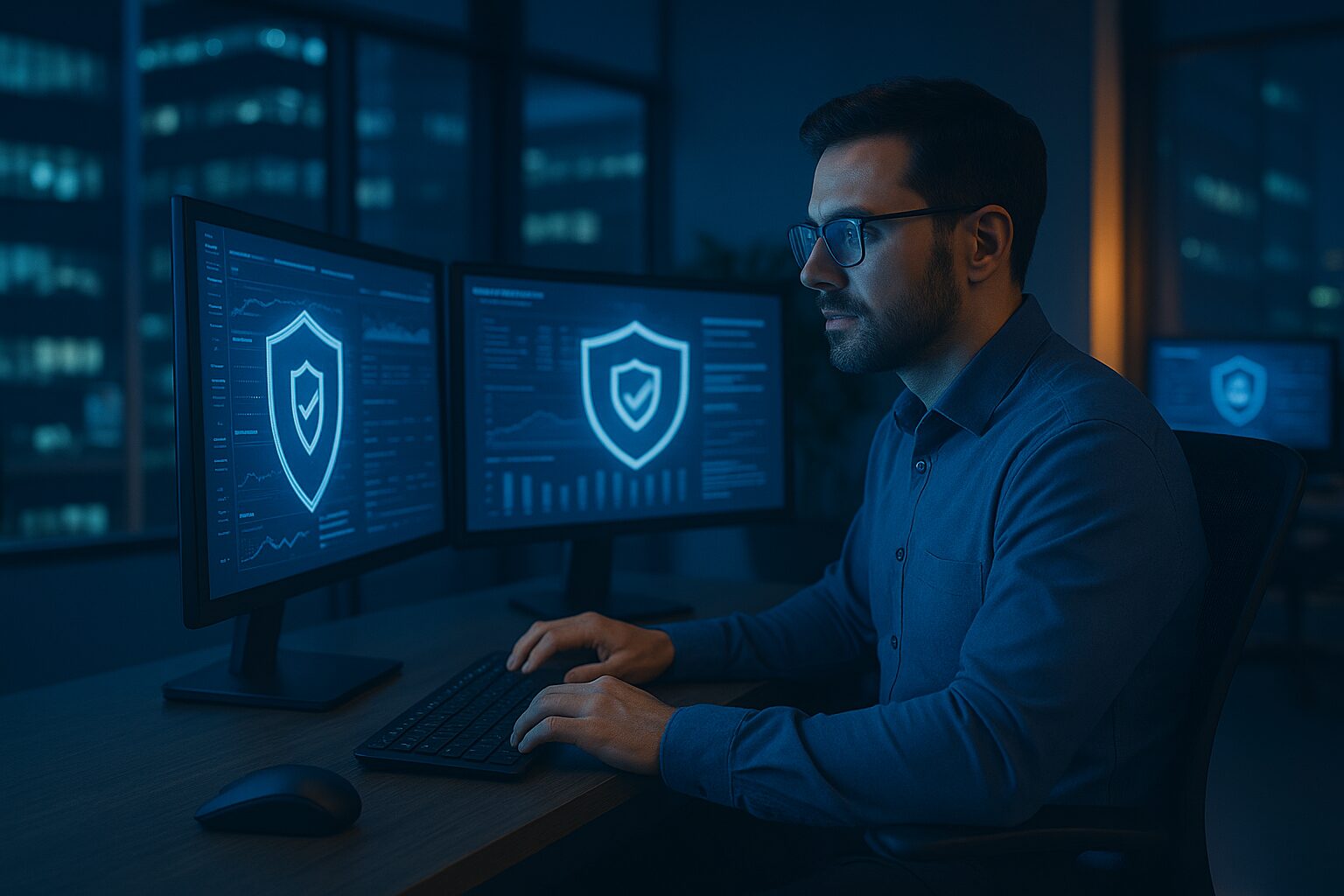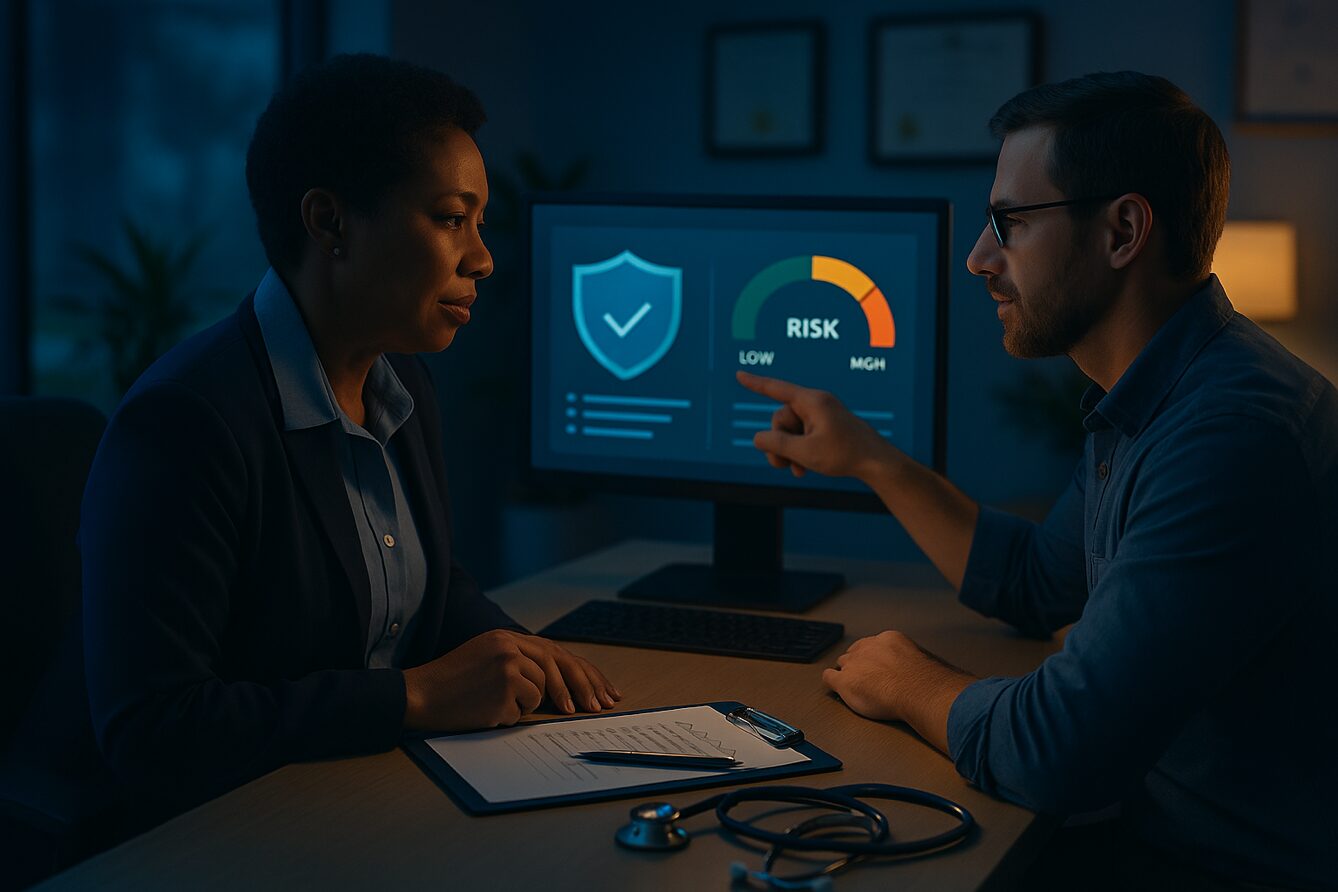Proper cyber hygiene at a long-term care facility is critical in protecting resident data and remaining compliant with healthcare regulations.
Long-Term Care Cybersecurity Summary
Maintaining robust cybersecurity in healthcare is essential to stay on the right side of regulatory requirements. If you are involved in managing a long-term care facility, making sure that your staff and residents are protected against common cyber threats can improve your security stance while improving the quality of life for those in your care.
In many cases, outsourcing your cybersecurity to a company that specializes in IT services can provide you with added peace of mind when dealing with risk management in senior living communities. These professionals can often provide assistance with compliance issues, cybersecurity best practices, secure firewalls for healthcare data, and access controls for care providers.
Proactive risk management is essential to manage risks in the healthcare industry. Here are some ways to protect your healthcare facilities and patients against cybersecurity threats while maintaining connectivity for your staff members and residents.
Educate Your Residents
Studies have shown the benefits of technology use for older adults, including reduced depression and loneliness, improved connections with social networks, and overall better mental and physical health. These benefits, however, do come with associated risks. Educating the staff and the residents of nursing homes and other long-term care facilities about these potential risks can reduce cybersecurity risks in the healthcare sector:
- Ransomware attacks: Ransomware is a type of malware that encrypts data on the systems it infects. These cyber attacks can be unsettling or even frightening for adults in assisted living facilities. By ensuring caregivers and patients are aware of these risks and know what to do when ransomware attacks occur, you can reduce stress and worry for patients and caregivers in senior care environments.
- Phishing: Attempts to access sensitive patient information like social security numbers, financial information, and other personally identifiable information often come in the form of friendly emails or texts. Educating patients at care facilities about the tactics used by cybercriminals to access confidential data can prevent many phishing attempts.
- Malware: Visiting suspicious websites or clicking on links in emails can sometimes result in computer viruses being installed on personal computers or mobile devices. Alerting your care providers and residents in your care facilities to these risks can reduce the chance of malware infections.
- Data breaches and data loss: Instituting robust safeguards against data breaches can be challenging. Working with a company that specializes in cybersecurity measures for healthcare organizations can allow you to achieve better data protection for your patients and your facility. Your IT service provider can create backups for key data and can allow you to secure health information and other data to protect your patients and your organization.
- Hackers: Most hackers do not target individuals. As a healthcare facility, however, you may be at risk of hacking attacks that seek financial information or health records that can be used to leverage other criminal activities. Medical devices can be targeted by cybercriminals who use their control over these devices to cause harm to individuals, gain access to healthcare networks, or disrupt activities in patient care facilities. Instituting protections for these devices requires the help of a company with the know how and the advanced skills needed to secure the networks on which these medical devices operate.
- Scams on social media sites: Older adults can be far more vulnerable to scams on social media sites. These may include requests for payment or romance scams in which someone poses as a potential romantic interest for these vulnerable individuals. The right cybersecurity education can reduce the risk of financial losses due to these types of scams.
- Identity theft: The release of confidential financial or patient data can sometimes allow criminals to take out loans or credit cards in the name of the individuals affected. Making sure that your organization safeguards medical and financial records and that your residents are aware of the risks of identity theft can provide reliable protection against these attacks. Regular monitoring of credit reports can also offer added help in spotting cases of identity theft before they become serious problems for your patients.
- Apps on mobile devices: Most mobile apps are safe and provide added functionality for smartphones and tablets. In some cases, however, mobile apps can be used to deliver a viral payload that could give cybercriminals access to personal or financial information. By educating residents of your long-term care facility about the potential dangers of unknown apps, you can address these vulnerabilities to ensure greater safety for patients in your care.
Making sure that your residents and staff members are aware of the risks in the online world can often reduce the chance that they will fall prey to these cyber attacks. Working with a trusted partner in the IT field can allow you to provide accurate information and establish a security program that works for you, your staff, and the patients you serve.
Staying on the Right Side of Healthcare Regulations
The Health Insurance Portability and Accountability Act (HIPAA) established rules regarding data protection for patient records and confidential patient information. The U.S. Department of Health and Human Services (HHS) enforces compliance with HIPAA regulations and outlines cybersecurity measures that must be put in place to safeguard patient information. Under the HIPAA Security Rule, healthcare organizations are required to put in place a comprehensive plan that includes physical, administrative, and technical barriers to unauthorized access to patient records.
A company specializing in cybersecurity solutions for the healthcare sector can often assist in achieving full compliance with all aspects of federal, state, and local regulations regarding the protection of patient data. These companies can log all traffic to your facility and can provide you with detailed recommendations for upgrading your networks and cybersecurity measures. This can add up to a safer environment for patients at your facility and better protection for confidential data for your healthcare organization.
What Healthcare Organizations Can Do To Protect Patients
While educating staff members and patients at your facilities is a great first step toward creating a safer online environment, your healthcare organization can also take proactive steps to reduce risks for everyone associated with your long-term care community. Some of the most positive steps you can take are listed here:
- Create a robust cybersecurity plan: A program that includes access controls for care providers and protections against data breaches can reduce the risk of unauthorized access to patient information. Your security plan can also be used as evidence that you are in compliance with applicable regulations for your care facilities and that you have made honest efforts to protect patient information against data breaches and cybercriminal activity.
- Use strong passwords and multi-factor authentication: Not only are these measures required to maintain compliance with HIPAA, they are also great ways to reduce the risk of unauthorized intrusion into your servers and databases.
- Log all traffic to and from your servers: Working with a professional cybersecurity team can allow you to keep detailed logs of incoming and outgoing traffic to spot trends that could spell trouble for your organization.
- Identify vulnerabilities and address them proactively: Knowing where your network and server weaknesses are can allow you to take steps to close gaps in your security and can provide superior protection for sensitive patient information for senior living communities.
- Invest in reliable data protection: By establishing a relationship with a professional IT service provider, you can reduce threats to your organization and promote the best environment for your residents and staff members.
- Maintain compliance with regulatory requirements: Complying with all HIPAA regulations regarding protections for patient data and health records is absolutely essential in the healthcare sector. Companies that specialize in cybersecurity and compliance can assist you in setting up robust protections and properly managing data for your facilities.
- Implement cybersecurity best practices: Putting a plan in place that encompasses physical, technical, and administrative aspects of your facility’s security is the first step toward protecting patients more effectively. Your plan should include tiered access controls and networking security to provide the best protection for health information. Education is also vital to prevent data breaches and other issues that could affect the security of your systems, networks, and databases.
By outsourcing your online security and data protection activities to a company that specializes in these tasks, you can ensure the most effective approach for maintaining robust security and data protection. At Meriplex, we work with you to create a comprehensive security plan that meets HIPAA requirements and will help you protect your residents against cyber attacks more effectively. Our team can provide customized services that are precisely right for your long-term care facility.
Choosing the Right Partner for Your Networking and Online Security Needs
Meriplex offers an array of services designed to help you manage data protection for your senior living facility or long-term care nursing homes. Our team has the knowledge and the proven expertise to keep your residents safer and your data secure.
To learn more about the services we offer for healthcare organizations, visit us online to request more information. At Meriplex, we are here to help you navigate the online world safely and securely.



